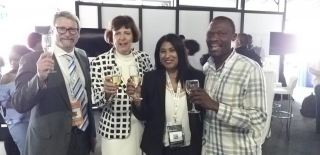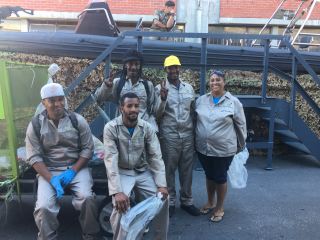PLASTICS INDUSTRY UPBEAT AND HOPEFUL FOLLOWING SUCCESS OF PLASTICS COLLOQUIUM
Plastics SA, the umbrella body representing all sectors of the South African Plastics Industry (including polymer producers and importers, converters, machine suppliers, fabricators and recyclers) has congratulated the Department of Environmental Affairs, Forestry and Fisheries (DEAFF) on the hosting of a very successful Plastics Colloquium in Boksburg recently.
According to Anton Hanekom, Executive Director of Plastics SA, they applaud DEAFF Minister Barbara Creecy’s pro-active approach, openness and willingness to learn first-hand about the many successful projects that the various role-players in the plastics industry have initiated and been running over the past 10 years. “As an industry, we have been the first to acknowledge the need to reduce the impact plastics have on the environment and ensure that plastic litter does not end up in our oceans, water sources or anywhere in nature. To this end, Plastics SA and the four plastic Producer Responsibility Organisations (PROs), namely Petco, Polyco, SAVA and the Polystyrene Association of SA have launched various recovery and recycling projects, with which we have had great success. It was encouraging that Minister Creecy created an opportunity for the industry to showcase these achievements to her, her department and other environmental groups. Instead of blindly bowing to the pressure of anti-plastic campaigners, she expressed a willingness to engage with us,” Hanekom says.
An estimated 500 people representing the entire plastics value chain attended the Plastics Colloquium on the 21stand 22nd of November, which was presented in collaboration with the Consumer Goods Council South Africa (CGCSA) and Plastics SA. More than 50 exhibitions demonstrated the plastics industry and other stakeholders’ commitment to Extended Producer Responsibility, recycling and creating a circular economy. Attendees represented government, civil society, brand owners, recyclers, waste management companies, waste pickers, NGO’s and SMMEs who were all encouraged to attend the presentations, panel discussions and visit the exhibitions.
Speaking at the opening of the Colloquium, Minister Creecy said: “Plastics have been with us since the 1950s. Because it is so versatile, it is used throughout modern society. The material is waterproof, durable, versatile and inexpensive. However, these characteristics are precisely what create so many pollution problems. With the growth in plastic consumption, concerns about plastic pollution are also growing”. She praised the work done by both government and the private sector in terms of the setting up of infrastructure for the recovery and recycling of plastic and the informal sector for collecting much of these materials, but warned that the evidence suggested much more still needed to be done.
“It is time to combine the wealth of collective experience to relook at the complex and difficult problem. Considering the whole value chain and lifecycle of products, the aim is to develop a comprehensive plan as part of an ongoing initiative that would engage all citizens to create a love for South Africa and the environment,” Creecy said, highlighting the need for a holistic approach to be taken in line with the principles of the circular economy.
“We found it hugely reassuring to hear that the Minister shares our passion to get South Africans recycling and separating their waste at home. By implementing effective waste management services at municipalities around the country, we will be able to get access to good quality, recyclable waste and reduce the burden on our country’s landfills. This will also be a major step forward in preventing plastic from entering our rivers and, eventually, the sea,” Hanekom says.
Another major focus at the Plastics Colloquium, was the importance and value of creating a circular economy. “Waste can be converted into value. Every ton of waste that ends up on dumpsites creates one job opportunity. However, every ton of waste that gets recycled, creates 18 jobs," the Minister stressed. Key to creating a circular economy is ensuring that plastic products and packaging are designed with their recyclability in mind. To this end, the challenge was made to brand owners, packaging designers and manufacturers to design products that are not only fit-for-purpose, but also environmentally responsible.
Looking ahead and explaining what the next steps will be, Hanekom says the Minister and her team will be drawing up a Master Plan, consisting of targets and timeframes, in consultation with industry. “The working groups of the SA Initiative to End Plastic Waste will continue their work and will be giving quarterly feedback to the Minister about their progress. They have been tasked to develop evidence-based solutions that will fit our unique South African context, and come back with suggestions and recommendations. A second Plastics Colloquium is proposed for next year to monitor the progress made and ensure that the plans are implemented effectively and that all of the talking that has happened until now, doesn’t end up as empty promises,” he explains. “We are optimistic about what the future holds for the plastics industry and the rest of the country as a whole. It is clear that for the first time in many years a relationship of trust has developed between government, industry and other role-players. There is a spirit of cooperation and a willingness to work shoulder to shoulder to find the best solution possible for everybody concerned,” Hanekom concludes.
For more information, please visit www.plasticsinfo.co.za
Rich booty of waste collected at 2017 SA Navy Festival
The Plastics|SA Clean-Up crews were once again in action at this year’s SA Navy Festival that took place at the Simonstown harbour from the 17th to the 19th of March.
According to John Kieser, Plastics|SA’s Sustainability Manager and coordinator of the clean-up crews, each year close to 50 000 people visit this event daily for the chance to see some of the country’s biggest naval ships and exhibitions on display.
“This is a very popular festival that is always very well attended by members of the public. As a result, we find that it also produces the biggest variety of waste,” Kieser says. Large volumes of Expanded Polystyrene (EPS), aluminium cooldrink cans and Low-Density Polyethylene (LDPE) were sent away for recycling, whilst organic waste was sent away for composting to Noordhoek.
“We managed to collect approximately 35 large bags of good quality polystyrene that were discarded in the form of take-away containers, but also protective packaging that was used around the ammunition and valuable items that were on display,” Kieser said. This material was delivered to a Cape Town based recycler who uses the post-consumer polystyrene in lightweight concrete used for building and construction applications.
“Our sincere gratitude goes to the Plastics|SA Sustainability Council for the excellent work they are doing on the ground at these events by working closely with the clean-up crews, but also in manning the exhibition stands where they educate members of the public about the importance of recycling. Through their on-going, consistent and visible efforts, they bolster the recycling efforts of the various material recovery organisations (MROs) and help us to divert tons of valuable material from our country’s landfills,” says Adri Spangenberg, Director of the Polystyrene Packaging Council (PSPC).
The final big sporting and spectator event on the Plastics|SA Clean-Up crew’s agenda for this month is the Old Mutual Two Oceans Marathon that will be taking place on the 15th of April 2017.
SovTech Invests in New Joint Venture with Zambian-Based Waste Recycling Company; TrashBack
SovTech, a leading Johannesburg-based software development company, has entered into an agreement to invest in a new joint venture alongside TrashBack, a Zambian-based waste recycling company. The new entity, to be named BioEx Tech (Biometric Exchange Technology), is the creator and distributor of an innovative recycling management software product. The company will operate initially in both Zambia and South Africa, with an eye to expanding into nine other African countries where their clients are based, within the next 36 months. Gerald Neves, SovTech’s CEO, is enthusiastic about the prospects for BioEx Tech. “The opportunity for waste management in Africa, especially at the bottom of the pyramid, is a multi-billion dollar opportunity. We are excited about embarking on this continental journey with dedicated partners such as Kathryn Warner (Trashback Group MD) and her experienced management team.” Wastepreneurs, as they have been dubbed, are individuals who make an independent living reclaiming recyclable waste from the waste stream - predominantly from landfill sites - and selling it on to recycling companies. In South Africa it is estimated that 85,000 people make a living as wastepreneurs.
Andrew McNaught, TrashBack’s Director of Business Development says that “TrashBack’s waste management software is built from the ground up with a focus on enabling and formalising the informal sector. It gives key insights into the waste and recycling value chain through interactions with informal waste collectors, waste traders and buy back centres. The platform utilises alternative value payouts, whereby cash management and cash payments that were previously risky and expensive are now traceable, safe and reliable given the use of mobile and electronic payments. The system also provides valuable market insights as information that was previously difficult to access is now collated across the value chain providing transparency at all levels and enabling access to information for even the entry level collector to make informed business decisions.” BioEx Tech’s innovative software simplifies waste management operations and provides the required functionality to monitor operations, material flow and finances; delivering a system which not only provides access to key operational insights in a business, but fulfils the role of a waste management financial platform.
The system is built around biometric fingerprint recognition, allowing the monitoring of suppliers across multiple buy-back recycling centers. Offering both online and offline functionality as well as being able to run off of a desktop computer or on mobile devices, this allows the system to be adapted to any environment, from urban centres in major cities to more rural or shorter term implementations. The BioEx Tech also integrates with a range of digital scales as well as advanced material tracking modules for supply chain management. Over the next few months, BioEx Tech will begin installing the new software platform in partnership with key clients, Zambian Breweries (a subsidiary of AB InBev) and SAPPI before rolling it out to the wider market across Zambia and South Africa from early 2017.
About SovTech SovTech is a leading software development platform for businesses in Africa. Believing that rapid innovation in software, cloud and mobile technology will fundamentally revolutionise business for small, medium and large enterprises, SovTech’s platform offerings give businesses instant access to world class software development, leading cloud-based software-as-a-service products and a library of enterprise technology services.
About TrashBack TrashBack unlocks the value in waste to create a form of sustainable income in base of the pyramid communities. From its humble beginnings in Cape Town, South Africa, to a now multi-national enterprise, with collection hubs situated in Cape Town, Lusaka and Johannesburg, TrashBack has succeeded in creating over 2000 opportunities for the homeless, informal & base of the pyramid sectors




